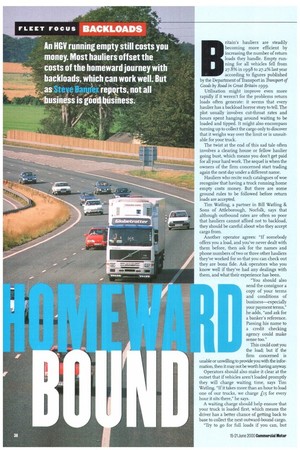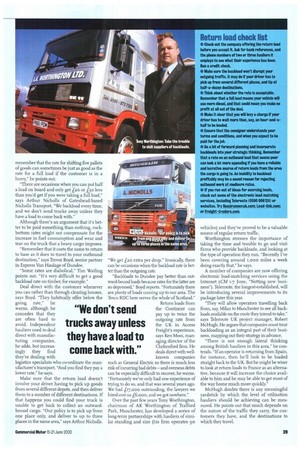An HGV running empty still costs you money. Most hauliers
Page 40

Page 41

If you've noticed an error in this article please click here to report it so we can fix it.
offset the costs of the homeward journey with backloads, which can work well. But
as "le Bari reports, not all business is good business. ritains hauliers are steadily becoming more efficient by increasing the number of return loads they handle. Empty running for all vehicles fell from 27.8% in 1998 to 27.2% last year according to figures published by the Department of Transport in Transport of Goods by Road in Great Britain
Utilisation might improve even more rapidly if it weren't for the problems return loads often generate: it seems that every haulier has a bacldoad horror story to tell. The plot usually involves cut-throat rates and hours spent hanging around waiting to be loaded and tipped. It might also encompass turning up to collect the cargo only to discover that it weighs way over the limit or is unsuitable for your truck.
The twist at the end of this sad tale often involves a clearing house or fellow haulier going bust, which means you don't get paid for all your hard work. The sequel is when the owners of the firm concerned start trading again the next day under a different name.
Hauliers who recite such catalogues of woe recognise that having a truck running home empty costs money. But there are some ground rules to be followed before return loads are accepted.
Tim Watling, a partner in Bill Watling & Sous of Attleborough, Norfolk, says that although outbound rates are often so poor that hauliers cannot afford not to baddoad, they should be careful about who they accept cargo from.
Another operator agrees: "If somebody offers you a load, and you've never dealt with them before, then ask for the names and phone numbers of two or three other hauliers they've worked for so that you can check out they are bona fide. Ask operators who you know well if they've had any dealings with them, and what their experience has been.
"You should also send the consignor a copy of your terms and conditions of business—especially your payment terms," he adds, "and ask for a banker's reference. Passing his name to a credit checking agency could make sense too."
This could cost you the load; but if the firm concerned is unable or unwilling to provide you with the information, then it may not be worth having anyway.
Operators should also make it clear at the outset that if vehicles aren't loaded promptly they will charge waiting time, says Tim Watling. "If it takes more than an hour to load one of our trucks, we charge i/5 for every hour it sits there," he says.
A waiting charge should help ensure that your truck is loaded first, which means the driver has a better chance of getting back to base to collect the next outward-bound cargo.
"Try to go for full loads if you can, but remember that the rate for shifting five pallets of goods can sometimes be just as good as the rate for a full load if the customer is in a hurry," he points out.
"There are occasions when you can put half a load on board and only get i'20 or bo less than you'd get if you were taking a full load," says Arthur Nicholls of Gateshead-based Nicholls Transport. "We backload every time, and we don't send trucks away unless they have a load to come back with."
Although there's an argument that it's better to be paid something than nothing, rockbottom rates might not compensate for the increase in fuel consumption and wear and tear on the truck that a heavy cargo imposes.
"Remember that it costs the same to return to base as it does to travel to your outbound destination," says Trevor Boyd, senior partner in Express Van Haulage of Dundee.
"Some rates are diabolical," Tim Watling points out. "It's very difficult to get a good backload rate on timber, for example."
Deal direct with the customer whenever you can rather than through clearing houses, says Boyd. "They habitually offer below the going rate," he warns, although he concedes that they are often hard to avoid. Independent hauliers used to deal direct with manufacturing companies, he adds, but increasingly they find they're dealing with logistics specialists who co-ordinate the manufacturer's transport. "And you find they pay a lower rate," he says.
Make sure that the return load doesn't involve your driver having to pick up goods from several different depots, and then deliver them to a number of different destinations. If that happens you could find your truck is unable to get back to collect an outwardbound cargo. "Our policy is to pick up from one place only, and deliver to up to three places in the same area," says Arthur Nicholls. "We get /20 extra per drop." Ironically, there can be occasions when the backload rate is better than the outgoing rate.
"Backloads to Dundee pay better than outward-bound loads because rates for the latter are so depressed," Boyd reports. "Fortunately there are plenty of loads coming up to our area The Tesco RDC here serves the whole of Scotland."
Return loads from the Continent can pay up to twice the outgoing rate from the UK in Access Freight's experience, says Ken Moss, managing director of the Chelmsford firm. He deals direct with wellknown companies such as General Electric so there is much less risk of incurring bad debts—and overseas debts can be especially difficult to recover, he warns. "Fortunately we've only had one experience of trying to do so, and that was several years ago. We had £17,000 outstanding, the lawyers we hired cost us £6,000, and we got nowhere."
Over the past few years Tony Worthington, chairman of AK Worthington of Trafford Park, Manchester, has developed a series of long-term partnerships with hauliers of similar standing and size (his firm operates 90 vehicles) and they've proved to be a valuable source of regular return traffic.
Worthington stresses the importance of faking the time and trouble to go and visit firms who provide backloads, and looking at the type of operation they run. "Recently I've been covering around r,000 miles a week doing exactly that," he says.
A number of companies are now offering electronic load-matching services using the Internet (CM 1-7 June, "Netting new business"). Teleroute, the longest-established, will be introducing several improvements to its package later this year.
"They will allow operators travelling back from, say, Milan to Manchester to see all backloads available on the route they intend to take," says Teleroute UK project manager, Robert McHugh. He argues that companies must treat bacldoading as an integral part of their business, mapping out their strategy in advance.
"There is not enough lateral thinking among British hauliers in this area," he contends. "If an operator is returning from Spain, for instance, then he'll look to be loaded straight back to the UK. But he might be wiser to look at return loads to France as an alternative, because it will increase the choice available to him and he may be able to get most of the way home much more quickly."
McHugh doubts there is any meaningful yardstick by which the level of utilisation hauliers should be achieving can be measured. He points out that much depends on the nature of the traffic they carry, the customers they have, and the destinations to which they travel.












































































































